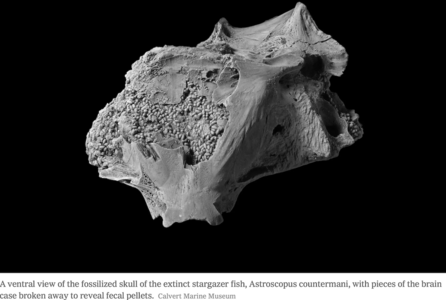- Joined
- Apr 30, 2005
- Messages
- 34,375
Who knew?
Oh, the wonders of science!

Partial SNIP...
It’s a dubious distinction in the fossil record: For the first time, a vertebrate has been found with fecal pellets where its brain once was.
The fossilized animal was Astroscopus countermani, an extinct fish first described as a separate species in 2011 in Maryland. Also known as a stargazer because its eyes were on top of its head, it was the earliest known member of its family and its genus, which still hunts prey on seafloors all over the world. But approximately 7.5 million to 10.5 million years ago in the Miocene era, scientists suspect this stargazer specimen, which may have been the size of today’s trout, died and its braincase might have been infiltrated by polychaetes or another kind of annelid worm. The creatures may have scavenged the dead fish’s brain, leaving a profuse amount of excrement in their wake.
Source:
(may require subscription)

 www.nytimes.com
www.nytimes.com
Oh, the wonders of science!

Partial SNIP...
It’s a dubious distinction in the fossil record: For the first time, a vertebrate has been found with fecal pellets where its brain once was.
The fossilized animal was Astroscopus countermani, an extinct fish first described as a separate species in 2011 in Maryland. Also known as a stargazer because its eyes were on top of its head, it was the earliest known member of its family and its genus, which still hunts prey on seafloors all over the world. But approximately 7.5 million to 10.5 million years ago in the Miocene era, scientists suspect this stargazer specimen, which may have been the size of today’s trout, died and its braincase might have been infiltrated by polychaetes or another kind of annelid worm. The creatures may have scavenged the dead fish’s brain, leaving a profuse amount of excrement in their wake.
Source:
(may require subscription)

Why Did a Fish Have Fossilized Feces Where Its Brain Once Was? (Published 2022)
It’s the first time a vertebrate’s braincase has ever been found full of coprolites, scientists say.



300x240.png)